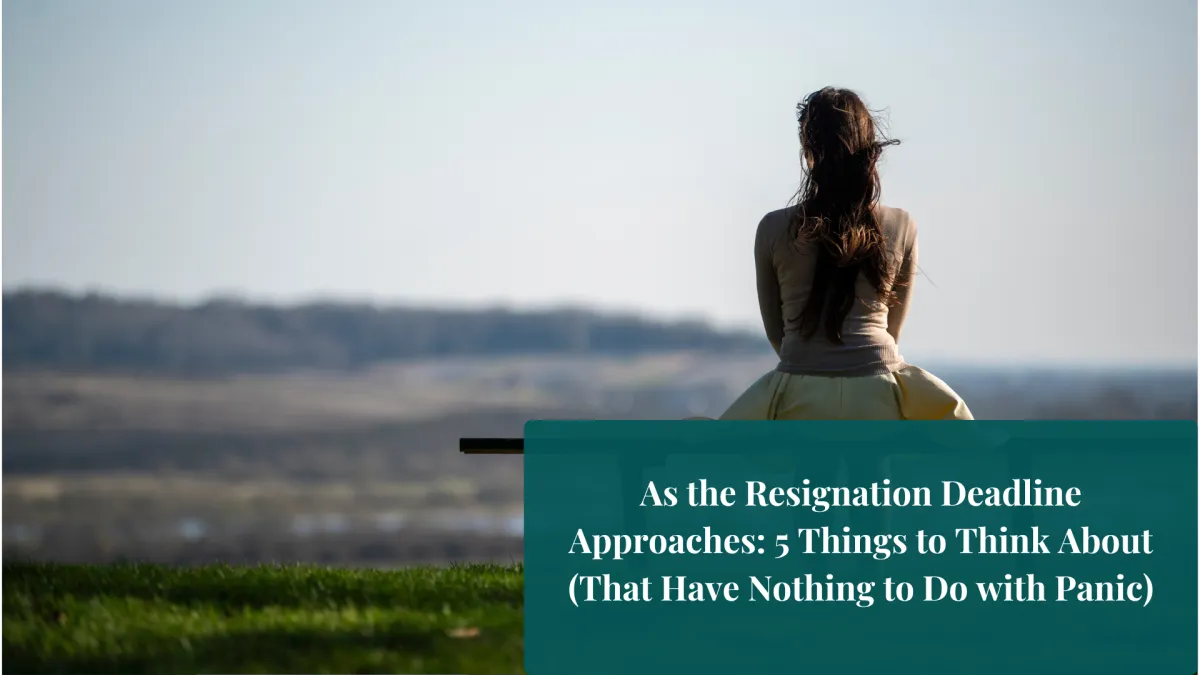Find out latest news, insights and tips from Aster Academy
Blog

As Resignation Deadlines Loom: What If This Isn’t About Quitting, But About Choosing?
As the Resignation Deadline Approaches: 5 Things to Think About (That Have Nothing to Do with Panic)
There’s something about the 31st of May that creates a very particular kind of silence.
It’s the silence of not knowing what to do: of weighing up one of the most significant professional decisions you might ever make, while everyone else seems to just… get on with it.
If you’re considering resigning from teaching, you might be expecting a big motivational moment or some kind of inner breakthrough.
But here’s the truth: most people I know who left didn’t have a lightning bolt of clarity.
They had a feeling and they tested it.
Quietly and cautiously.
Which is often the smartest way to start.
This post isn’t about telling you what to do. It’s about giving you thinking space and a few questions that go deeper than “Should I quit?”
1. Zoom out before you zoom in
The resignation deadline looms large when your world has shrunk to a single term, a single school, a single routine.
So before making any decision, ask:
Is it the profession I want to leave or just this version of it?
• Have you changed or has your context changed?
• Is it the marking, the pressure, the workload, or something deeper?
• Would things feel different in another school, or are your values no longer aligning with the role itself?
You can’t fix what you haven’t clearly named.
2. Track your energy, not just your stress
Lots of teachers leave because they’re burned out. But what if the more helpful question was:
When do I feel most energised and when do I feel most drained?
Try tracking this for 7 days:
Give yourself a score out of 10 for energy before and after the school day.
Make a note of the task or moment that felt best and the one that drained you most.
Patterns will show up fast.
Sometimes, what we assume is burnout is actually depletion from being in the wrong environment, doing the wrong kind of work.
3. Don’t chase clarity. Build it.
If you’re waiting for a “sign” to make the decision easier, you might be waiting a long time.
Clarity doesn’t arrive fully formed. It comes from action.
So, instead of asking “Should I resign?” try this:
What small experiment could I run in the next 4 weeks to gather more information?
Could I take on a tiny freelance project, explore job shadowing, or speak to three people in careers I’m curious about?
Think of this as data collection, not a commitment.
Career change doesn’t start with answers. It starts with asking better questions.
4. What does enough look like for you?
One of the biggest fears people have is financial.
But often, we’ve never defined what we actually need to earn, or what we’re willing to trade for a different lifestyle.
Try listing:
Your non-negotiables (mortgage, food, childcare)
Your nice-to-haves (gym, travel, weekly treats)
Your wants that might look different in a new season (e.g. longer holidays vs. weekday flexibility)
From there, you can calculate your minimum viable income - the number that gives you options, not perfection. It’s almost always less than the teaching salary you think you need to replicate.
5. Create a ‘No Decision’ Plan
Let’s say you decide not to resign (yet).
That doesn’t mean you do nothing.
It means you create a strategy to support yourself while you figure things out.
That might look like:
Booking a non-negotiable week off in summer to actually rest (no house moves, no CPD)
Starting a notebook or voice note diary where you regularly check in with your energy, goals and ideas
Finding one space or person outside of school where you can speak freely and be fully yourself
You don’t need to make a huge leap to take yourself seriously.
Final thought:
The resignation deadline isn’t a pass/fail test.
You don’t win for leaving or staying.
But you do owe yourself honesty.
And if you can look at the 31st May and say, “I gave myself time to think, not just react,” then that’s a decision made with self-respect not pressure.
There is no shame in staying.
There is no shame in going.
There’s just the next right step for you.

© 2023 Aster Academy - All Rights Reserved. Privacy Policy.




